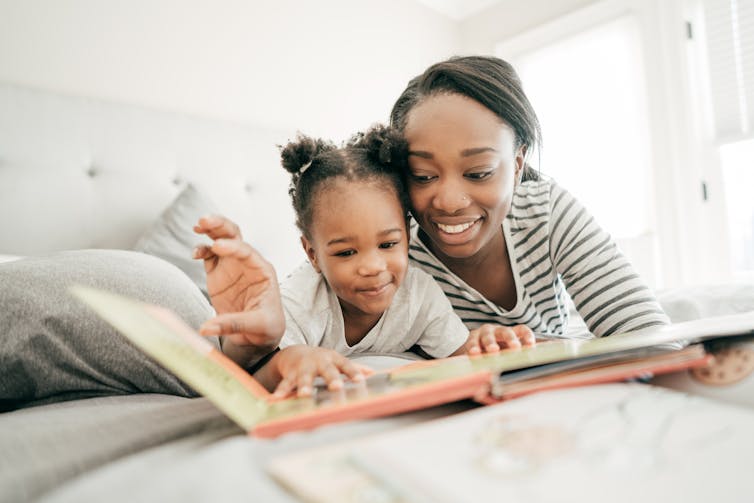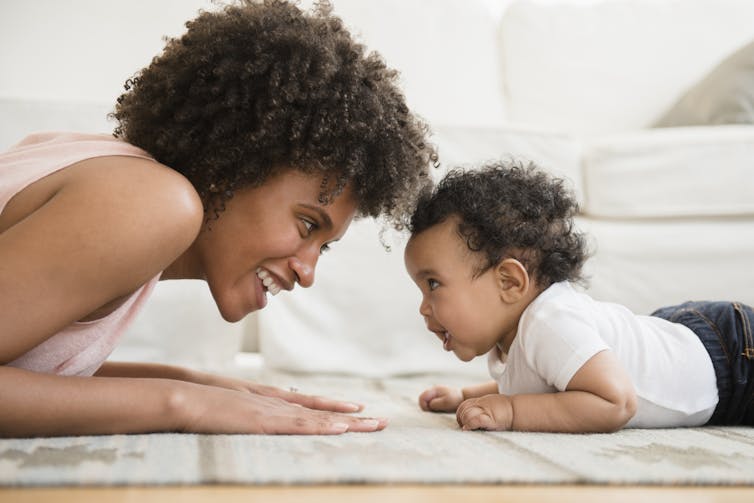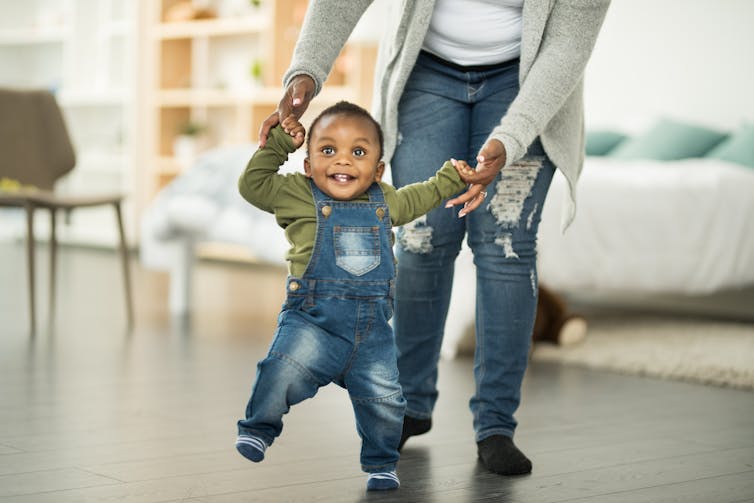Play is how children learn about the world, explore their environments, and engage in physical activity.
It’s also essential in nurturing children’s social, emotional and cognitive capabilities and is an important component of bonding with caregivers.
Playtime for children is as important for their development as exercise is for adult health. Guidelines have been developed in South Africa, which closely follow international guidelines, for how much sleep, physical activity and sedentary time children should get each day from when they are born.
Children under the age of two should spend as much tummy time – time spent on their tummies while they learnt to lift their heads, roll over, and eventually crawl – and active play time with their parents as possible. They should spend as little time as possible restrained in car seats, strollers and rockers.
Get news that’s free, independent and based on evidence.
Get newsletter
As I have found in my research, South African babies do not always meet these recommendations, and spend too much time restrained in devices or in front of the television.
Screen time is not recommended in the first two years of life at all. Children over two may watch up to an hour of television each day. Less is better.
Children who play a lot reach their developmental milestones, such as sitting, crawling and standing, quicker. They also have better social, emotional and cognitive development.
They are less likely to develop obesity too. All of these effects lead to better health and wellbeing during adulthood.
The amazing thing about play is that it is free. You serve as your child’s entertainment and are the best source of learning and growth for them.
Here are some simple ways you can help your baby’s development through play.

The magic of storytelling
Reading and storytelling are ideal ways to spend quiet time with your little ones rather than letting them watch television. Unsupervised television time can lead to language delays, and difficulties with focus and attention.
By the time your baby is one, they will have learnt sounds from you, and be starting to speak. The more stories you read aloud, the more words your baby will learn and the better they will be able to talk.
Between 6 and 12 months your baby is already starting to learn that a picture represents an object and by 12 months may start turning the pages and engaging with the story.
There are many other benefits of reading aloud to your baby, including improved brain development, specifically cognition.
Story time will encourage quietness and calm, which can work wonderfully as a bedtime routine to encourage better sleep. Make reading fun with lots of expression and different voices or by adding rhymes and songs and pulling funny faces.
Read the same thing over and over – this is how babies learn.

Every day is tummy time
Helping babies to roll, sit, crawl and walk provides them with the ability to explore their environment and develop both motor, and cognitive skills.
Tummy time is the first step to getting them mobile, and counts as their exercise for the day. Tummy time should start from the day they are born, with a few minutes at first, building up to longer stretches. Babies should be doing at least 30 minutes of tummy time each day.
Place babies on their tummies (on a safe surface or on your stomach) and use your voice to encourage them to lift their heads to look at you or to reach for a toy.
Babies use touch to learn, and they will develop better motor skills from having their hands and feet in contact with the ground, so take off socks and leggings during free play. During tummy time babies learn to push up on their hands and knees to start crawling.
Babies usually start crawling anytime between 6 and 9 months, but many babies will still be developing this skills beyond 9 months.
For babies who can crawl, create obstacle courses with safe, soft toys like teddy bears, pillows and blankets to encourage exploration and build core strength for standing. Get down on their level and explore the world with them.

Singing and funny dance moves
Have a dance party with your little one to keep them (and you) stimulated and active.
Small babies can be held while you dance, while older babies can get involved by holding onto objects and bouncing up and down.
Singing makes play time even more fun. Babies love to hear your voice, and singing can be energetic or soothing.
For older babies you can sing and make the movements at the same time to teach them while playing (think “heads, shoulders, knees and toes”).
Smaller babies will enjoy nursery rhymes such as “Eensy weensy spider” that go along with hand movements or clapping to keep them interested. Make lots of eye contact and try to make your baby laugh with funny dance moves.
Let your hair down and enjoy.
Everyday fun
Imagination helps children to understand the world by thinking about what they cannot see and imagining what comes next. Small babies will enjoy looking for hidden toys underneath a blanket or cushion, or watching you play peek-a-boo as they start to learn that you can go away from their view and will come back.
Mobile babies will enjoy hiding from you and listening to you search for them – make it fun by looking in silly places and telling your baby what you are doing. This develops their sense of “object constancy” – their ability to understand that they can spend short periods of time away from their parents safely, and that their parents still exist even when they can’t see them. Children who do not successfully develop a sense of object constancy may not form secure attachments, and may suffer from separation anxiety.
Older babies will love to copy what you are doing, play pretend, and explore homemade obstacle courses with you. Make everyday activities such as cooking and cleaning into a game by letting them copy along and “help you”. Have a baby-height drawer filled with safe objects for them to unpack and repack while you tidy up.
If you let your home become a safe area for children to explore, they will be free to move and play, becoming healthier, happier and more confident. So, embrace the mess, the laughter, and the learning that comes with play – it is one of the greatest gifts you can give your children.
Play is how children learn about the world, explore their environments, and engage in physical activity.
It’s also essential in nurturing children’s social, emotional and cognitive capabilities and is an important component of bonding with caregivers.
Playtime for children is as important for their development as exercise is for adult health. Guidelines have been developed in South Africa, which closely follow international guidelines, for how much sleep, physical activity and sedentary time children should get each day from when they are born.
Children under the age of two should spend as much tummy time – time spent on their tummies while they learnt to lift their heads, roll over, and eventually crawl – and active play time with their parents as possible. They should spend as little time as possible restrained in car seats, strollers and rockers.
As I have found in my research, South African babies do not always meet these recommendations, and spend too much time restrained in devices or in front of the television.
Screen time is not recommended in the first two years of life at all. Children over two may watch up to an hour of television each day. Less is better.
Children who play a lot reach their developmental milestones, such as sitting, crawling and standing, quicker. They also have better social, emotional and cognitive development.
They are less likely to develop obesity too. All of these effects lead to better health and wellbeing during adulthood.
The amazing thing about play is that it is free. You serve as your child’s entertainment and are the best source of learning and growth for them.
Here are some simple ways you can help your baby’s development through play.

The magic of storytelling
Reading and storytelling are ideal ways to spend quiet time with your little ones rather than letting them watch television. Unsupervised television time can lead to language delays, and difficulties with focus and attention.
By the time your baby is one, they will have learnt sounds from you, and be starting to speak. The more stories you read aloud, the more words your baby will learn and the better they will be able to talk.
Between 6 and 12 months your baby is already starting to learn that a picture represents an object and by 12 months may start turning the pages and engaging with the story.
There are many other benefits of reading aloud to your baby, including improved brain development, specifically cognition.
Story time will encourage quietness and calm, which can work wonderfully as a bedtime routine to encourage better sleep. Make reading fun with lots of expression and different voices or by adding rhymes and songs and pulling funny faces.
Read the same thing over and over – this is how babies learn.

Every day is tummy time
Helping babies to roll, sit, crawl and walk provides them with the ability to explore their environment and develop both motor, and cognitive skills.
Tummy time is the first step to getting them mobile, and counts as their exercise for the day. Tummy time should start from the day they are born, with a few minutes at first, building up to longer stretches. Babies should be doing at least 30 minutes of tummy time each day.
Place babies on their tummies (on a safe surface or on your stomach) and use your voice to encourage them to lift their heads to look at you or to reach for a toy.
Babies use touch to learn, and they will develop better motor skills from having their hands and feet in contact with the ground, so take off socks and leggings during free play. During tummy time babies learn to push up on their hands and knees to start crawling.
Babies usually start crawling anytime between 6 and 9 months, but many babies will still be developing this skills beyond 9 months.
For babies who can crawl, create obstacle courses with safe, soft toys like teddy bears, pillows and blankets to encourage exploration and build core strength for standing. Get down on their level and explore the world with them.

Singing and funny dance moves
Have a dance party with your little one to keep them (and you) stimulated and active.
Small babies can be held while you dance, while older babies can get involved by holding onto objects and bouncing up and down.
Singing makes play time even more fun. Babies love to hear your voice, and singing can be energetic or soothing.
For older babies you can sing and make the movements at the same time to teach them while playing (think “heads, shoulders, knees and toes”).
Smaller babies will enjoy nursery rhymes such as “Eensy weensy spider” that go along with hand movements or clapping to keep them interested. Make lots of eye contact and try to make your baby laugh with funny dance moves.
Let your hair down and enjoy.
Everyday fun
Imagination helps children to understand the world by thinking about what they cannot see and imagining what comes next. Small babies will enjoy looking for hidden toys underneath a blanket or cushion, or watching you play peek-a-boo as they start to learn that you can go away from their view and will come back.
Mobile babies will enjoy hiding from you and listening to you search for them – make it fun by looking in silly places and telling your baby what you are doing. This develops their sense of “object constancy” – their ability to understand that they can spend short periods of time away from their parents safely, and that their parents still exist even when they can’t see them. Children who do not successfully develop a sense of object constancy may not form secure attachments, and may suffer from separation anxiety.
Older babies will love to copy what you are doing, play pretend, and explore homemade obstacle courses with you. Make everyday activities such as cooking and cleaning into a game by letting them copy along and “help you”. Have a baby-height drawer filled with safe objects for them to unpack and repack while you tidy up.
If you let your home become a safe area for children to explore, they will be free to move and play, becoming healthier, happier and more confident. So, embrace the mess, the laughter, and the learning that comes with play – it is one of the greatest gifts you can give your children.
Source, theconversation.com




